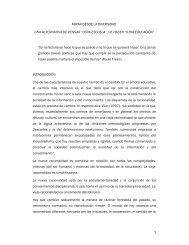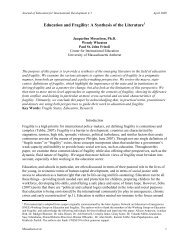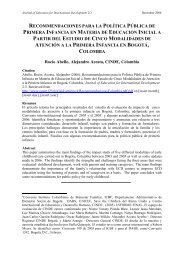The Power of Persistence: Education System ... - EQUIP123.net
The Power of Persistence: Education System ... - EQUIP123.net
The Power of Persistence: Education System ... - EQUIP123.net
You also want an ePaper? Increase the reach of your titles
YUMPU automatically turns print PDFs into web optimized ePapers that Google loves.
4. Technical validity, policies, capacity, and adequate resources to address<br />
funding gaps are necessary but not sufficient conditions to enable real<br />
change. Equally critical are political will and institutional commitment, which<br />
may rest on the intangible factors <strong>of</strong> relationships, trust, and credibility.<br />
In the case study countries, the primary drivers or constraints to system<br />
reforms were political and institutional. As a constraint, real progress on<br />
governance and management reforms in Egypt was not possible until large<br />
scale political issues had been addressed (a notable one being the eventual<br />
truce between the government and radical Islamists) and opportunities created<br />
for reform leadership could be exerted. In Zambia, critically needed changes<br />
supporting decentralization and community schools in the 1996 <strong>Education</strong><br />
Act were not addressed until five years after their articulation in the National<br />
<strong>Education</strong> Policy. At the time <strong>of</strong> this writing, a revised education act is with<br />
the Zambian Parliament, even as policy changes continue to be implemented<br />
at Ministry HQ and decentralized levels. As a driver, the strong political power<br />
and leadership <strong>of</strong> key ministers <strong>of</strong> education in El Salvador and Nicaragua<br />
have powerfully influenced how the reform agenda is pursued.<br />
<strong>The</strong> obvious value <strong>of</strong> leadership in driving reform easily tends to move observers<br />
toward a ‘great man’ view that valorizes the role <strong>of</strong> charismatic and politically<br />
powerful leaders. Certainly, in the case studies there are sufficient examples <strong>of</strong><br />
strong leaders enabling reforms to encourage such a view. Egypt’s proliferation<br />
<strong>of</strong> policy reforms came about with the appointment <strong>of</strong> a new MOE in 2005, and<br />
the policies <strong>of</strong> Humberto Belli dominated Nicaraguan education for a decade<br />
after he left <strong>of</strong>fice. El Salvador’s long string <strong>of</strong> qualified, effective Ministers<br />
and deputy ministers was an undeniable factor in the country’s stability and<br />
progress, and Namibia’s strong leadership that began with Nahas Angula set the<br />
stage for years <strong>of</strong> continuous progress. Of course, it is also true that individual<br />
support requires political and social conditions to be favorable to specific<br />
reforms. In Egypt, for example, the same Minister who limited decentralization<br />
reforms throughout the 1990s approved the decentralization pilot in Alexandria<br />
and the delegation to the six other governorates once the radical Islamist threat<br />
and other issues had been addressed. As the case studies demonstrate, effective<br />
and committed leaders make good reform more likely than do weak leaders.<br />
But a reliance on individual leaders to effect reforms may be thwarted by the<br />
ordinary fact that commitment, charisma, and championship <strong>of</strong> reforms are<br />
not traits inherent to positions, and successors will not inevitably have the<br />
same desirable qualities as their predecessors. People change jobs and roles,<br />
they go away entirely, and permanent leadership is not possible even if it were<br />
desirable. Fortunately, another lesson <strong>of</strong> the case studies is that political will<br />
SECTION 3: SUMMARY fINdINGS ANd CONClUSIONS<br />
139

















